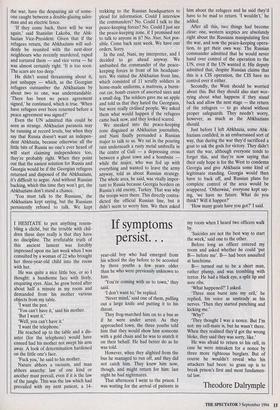If symptoms
persist. . .
I HESITATE to pen anything resem- bling a cliché, but the trouble with chil- dren these days really is that they have no discipline. The irrefutable truth of this ancient lament was forcibly impressed upon me last week when I was consulted by a woman of 22 who brought her three-year-old child into the room with her.
He was quite a nice little boy, or so I thought: a handsome face with lively, enquiring eyes. Alas, he grew bored after about half a minute in my room and demanded from his mother various objects from my table.
'I want the pen.'
'You can't have it,' said his mother. 'But I want it.'
'Well, you can't have it.'
'I want the telephone.'
He reached up to the table and a dis- aster (for the telephone) would have ensued had his mother not swept his arm away. A look of determination hardened on the little one's face.
'Fuck you,' he said to his mother.
Nature abhors a vacuum, and man abhors anarchy: law of one kind or another must prevail, even if it is the law of the jungle. This was the law which had prevailed with my next patient, a 14- year-old boy who had emerged from his school the day before to be accosted by three youths a few years older than he who were previously unknown to him.
'You're coming with us to town,' they said.
'I don't want to,' he replied.
'Never mind,' said one of them, pulling out a large knife and putting it to his throat.
They frog-marched him on to a bus as if he were under arrest. As they approached town, the three youths told him that they would show him someone with a gold chain and he was to snatch it on their behalf. He had better do as he was told.
However, when they alighted from the bus he managed to run off, and they did not catch him. They knew him now, though, and might return for him: last night he had nightmares.
That afternoon I went to the prison. I was waiting for the arrival of patients in my room when I heard two officers walk by.
'Suicides are not the best way to start the week,' said one to the other.
Before long an officer entered my room and asked whether he could 'put B— before me'. B— had been assaulted at lunchtime.
B— turned out to be a short man, rather plump, and was trembling with terror. He had a black eye, a split lip and sore ribs.
'What happened?' I asked.
'Three men burst into my cell,' he replied, his voice as unsteady as his nerves. 'Then they started punching and kicking me.'
'Why?'
'They thought I was a nonce. But I'm not: my cell-mate is, but he wasn't there. When they realised they'd got the wrong bloke, they said they was sorry, like.'
He was afraid to return to his cell, in case he were mistaken for a nonce by three more righteous burglars. But of course he wouldn't reveal who his attackers had been: to grass up is to break prison's first and most fundamen- tal law.
Theodore Dalrymple


























































 Previous page
Previous page